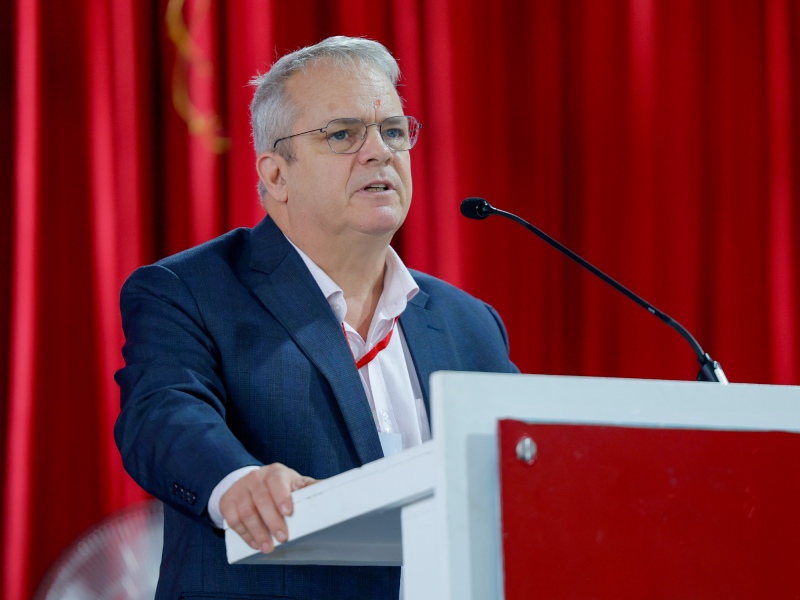Programs
- M. Tech. in Automotive Engineering -Postgraduate
- Building Disaster Resilience and Social Responsibility through Experiential Learning: Integrating AI, GIS, and Remote Sensing -Certificate

The International Conference on Sustainable & Resilient Futures (ICSRF 2025) opened today at Amritapuri with grandeur, uniting over 700 participants and 80 distinguished speakers from across the globe. Hosted by Amrita’s UNESCO Chair on Experiential Learning for Sustainable Innovation and Devlopment, School for Sustainable Futures and SustIN network, the four-day gathering is India’s first carbon-neutral academic conference, conducted in alignment with ISO 14068 standards.
Centered on the theme “Experiential Learning, Inclusiveness, & Sustainable Innovations”, the event brings together researchers, scientists, policymakers, civil society organizations, and industry leaders to co-create actionable pathways for global sustainability.
Inaugurating the conference, the Guest of Honor, Mr. Tim Curtis, Director of UNESCO New Delhi Regional Office for South Asia & UNESCO Representative to Bhutan, India, the Maldives and Sri Lanka, emphasized that education must go beyond technical knowledge to nurture empathy, resilience, and innovation. “Through the Greening Education Partnership, now active in more than 80 countries, UNESCO is promoting Green Schools, Green Curriculum, Green Teachers, and Green Communities,” he said, calling for inclusivity and values-driven education as a cornerstone of sustainability. He also highlighted that while UNESCO collaborates with many stakeholders to harness the power of education effectively, partnerships with institutions like Amrita University stand out as exemplary.
Smt. Uma Mahadevan Dasgupta, IAS, Additional Chief Secretary and Development Commissioner, Government of Karnataka, highlighted the state’s pioneering efforts in organic and zero-budget natural farming. She stressed the importance of climate-resilient agriculture and millet cultivation in ensuring food security. “Karnataka has demonstrated how sustainable agriculture can be scaled, not only for ecological health but also for economic resilience,” she remarked.
ICSRF 2025 also witnessed the inauguration of SREE (Sustainability & Resilience Geo Platform) and GeoSanskriti, a pioneering digital platform for Intangible Cultural Heritage. While SREE leverages digital twin and geospatial technologies for sustainable development, GeoSanskriti focuses on the protection of sacred groves and their ecological, cultural, and spiritual significance.
Speaking on behalf of the financial sector, Shri. Shaji K.V., Chairman, NABARD, underscored that sustainability is not optional but existential. “We must mainstream sustainable practices across agriculture, fisheries, water, housing, and transport. The time to act is now, not tomorrow,” he urged, underlining NABARD’s commitment to climate-resilient development.
He inaugurated Amrita’s Digital Twin Rural Clusters for Climate Adaptation. The platform aims to build Sustainable, Resilient, and Self-Reliant Ecosystems through Social Innovation and ClimateTech across areas such healthcare, energy access, disaster preparedness, agriculture, cultural heritage, and water security.
Other dignitaries who spoke included Swami Poornamritananda Puri, General Secretary of Mata Amritanandamayi Math, who delivered the benedictory address; Dr. P. Ajith Kumar, Registrar of Amrita Vishwa Vidyapeetham; and Dr. Maneesha Vinodini Ramesh, Provost and UNESCO Chair at Amrita, with the session concluding with a Vote of Thanks by Dr. Bipin Nair, Dean of the School of Biotechnology.
Across four days, ICSRF 2025 presents a diverse program including high-level panels on sustainability in education, finance, startups, and multistakeholder governance; workshops on pathways to net zero, a symposium on lake and reservoir management, and geospatial analysis; and tutorials on systems thinking, rural development, and publishing. The program also features NGO Conclave and Hackathons serving as vibrant platforms for grassroots innovation and collaborative problem-solving.
With representation from 30+ countries, including UNESCO, UN ESCAP, government, academia, industry, and civil society, ICSRF 2025 demonstrates how academic rigor, technological innovation, and compassionate values can converge.